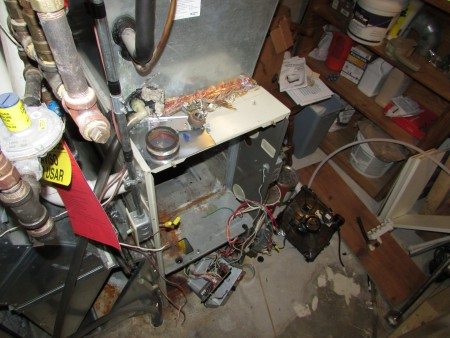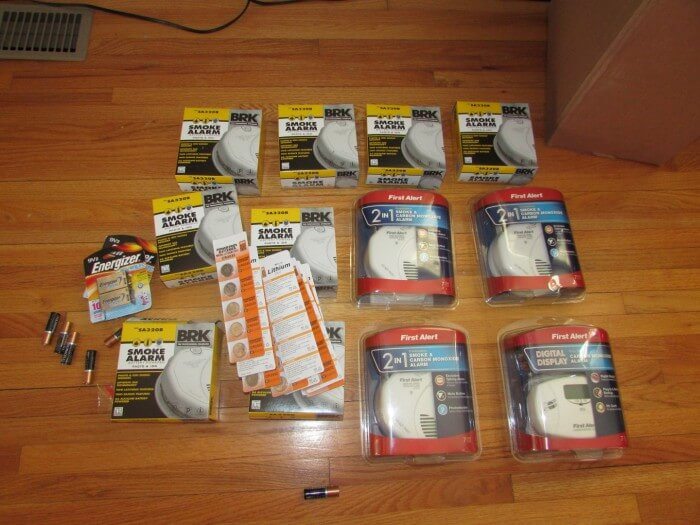Get photoelectric smoke alarms if you don’t already have them. There are two types of smoke alarms available, ionization and photoelectric, and there is a huge difference between the two. I never used to make any distinction between the two types of smoke alarms, because I never took the time to fully educate myself on the differences between the two. Today, I’m fully on board with photoelectric smoke alarms, and I recommend them in almost every one of my home inspection reports. So does everyone else in my company, I think.
I’ve blogged about photoelectric smoke alarms many times in the past, and I’ll give links to those blog posts at the end of this one. Rather than discuss the differences between photoelectric and ionization smoke alarms, I’ve got a great anecdote today.
 Last week, I inspected a house for a homeowner in Edina who recently had a major furnace malfunction. She had a sealed combustion, high efficiency furnace that somehow overheated, and continued to operate despite reaching dangerously high temperatures. When she arrived home, there was smoke pouring out of the supply registers and her house was filled with smoke.
Last week, I inspected a house for a homeowner in Edina who recently had a major furnace malfunction. She had a sealed combustion, high efficiency furnace that somehow overheated, and continued to operate despite reaching dangerously high temperatures. When she arrived home, there was smoke pouring out of the supply registers and her house was filled with smoke.
She called the fire department, and they promptly shut everything down upon arrival to troubleshoot what caused the problem. When they turned the furnace back on, they said it operated like a smoke generating machine. As it turned out, the furnace got so hot that the drain pan for the air conditioner completely melted, which is what generated all of the smoke. Both the Saint Louis Park and Edina fire departments said they had never seen anything like it, and had no explanation for the furnace malfunction.
The owner had smoke alarms installed in the common areas on every level of her home, and in every bedroom. She was religious about replacing the batteries in her smoke alarms every six months, they were all less than 10 years old, and they were all properly located. They were also all ionization alarms. You see where I’m going with this, right?
Throughout this whole event, not a single smoke alarm went off. Only after the fire department turned the furnace on for the second time to troubleshoot the issue did one of the smoke alarms in a particularly smoky room finally sound off.
The homeowner contacted her smoke alarm manufacturer to find out how her entire house could fill up with smoke without a single smoke alarm sounding off, and she was told that it’s important to have both types of smoke alarms in her home. The smoke alarm manufacturer also sent her a nice little care package of photoelectric and dual-sensor smoke alarms, shown below.

Would photoelectric smoke alarms have sounded off any faster? Yes, without a doubt. Photoelectric smoke alarms excel at detecting slow, smoldering fires, which is essentially what was happening inside of the furnace. Again, if you don’t have photoelectric smoke alarms installed in your home, get them. They cost a little more, but they can make a huge difference. Here’s a recent news story on the difference between the two smoke alarms, done in November of 2014 by WCCO / CBS News, along with the Coon Rapids Fire Department:
For specific info and stats on the importance of photoelectric smoke alarms, check out these previous blog posts that I’ve written on smoke alarms:

Dean
June 9, 2015, 8:22 am
Reuben,
I really liked your article on “Do you have photoelectric smoke alarms in your home?” do you mind if I post it on my website http://homeinspectionace.com, giving you and your website credit? I am a home inspector in Tampa FL.
Reuben Saltzman
June 9, 2015, 3:27 pm
@Dean – yes, you’re certainly welcome to. Thanks!
Frank
June 10, 2015, 6:12 pm
Is there a specific photoelectric smoke alarm that you recommend?
Reuben Saltzman
June 11, 2015, 3:50 am
@Frank – no. Any will do.
dexter
June 16, 2015, 7:55 am
I had an ionization alarm outside a bathroom that frequently went off because of steamy showers. Changed it out for a photoelectric and never had another false alarm (there are still other ionization alarms elsewhere in the house).